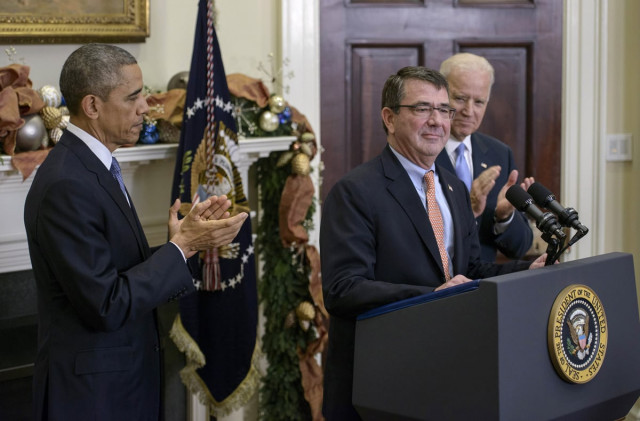New Pentagon chief Ashton Carter sworn in
Carter takes the helm as the United States wages an open-ended air war against the Islamic State in Syria and Iraq

Ashton Carter will be the 25th US Defence Secretary. PHOTO: AFP
Carter took the oath of office in a ceremony presided over by Vice President Joe Biden, who said the Pentagon chief faced the task of ensuring the American military remained "second to none" and that the government meet its "sacred obligation" to take care of those who volunteer for the armed forces.
Carter's predecessors often clashed with the White House, accusing senior aides of trying to micromanage the Pentagon's affairs.
In a statement released to Defense Department employees, Carter said: "I have pledged to provide the president my most candid strategic advice.
"I will count on your experience and expertise as I formulate that advice. I will also ensure the president receives candid professional military advice," he said.
The US Senate overwhelming approved Carter's nomination last week, after he signaled an independence of mind on some issues, including voicing his support for sending weapons to Ukraine's army.
Carter takes the helm as the United States wages an open-ended air war against the Islamic State in Syria and Iraq and amid concerns over Russia's backing of separatists in Ukraine.
In his statement, Carter said Washington faced "a turbulent and dangerous world."
The United States, he said, has to contend with "malignant and savage terrorism" in the Middle East, conflict in Afghanistan, tensions in the Asia-Pacific region, threats in cyberspace and a "reversion to archaic security thinking in parts of Europe" -- a reference to Russia's intervention in Ukraine.
After the swearing-in ceremony, Carter, 60, vowed to honor the dedication of US troops and promised he would "make decisions about sending them (troops) into harm's way with the greatest reflection and care."
A technocrat and physicist with years of experience at the Pentagon, Carter also made a "commitment" to "building a force for the future" that would stay technologically advanced.
To maintain public support, the Pentagon will need to "show that we can make better use of every taxpayer dollar," he said.
"That means a leaner organization, less overhead, and reforming our business and acquisition practices," he said in his statement.
He also warned of the problem posed by automatic budget cuts imposed by Congress, known as sequestration.
"We must steer through the turmoil of sequestration, which imposes wasteful uncertainty and risk to our nation's defense."



















COMMENTS
Comments are moderated and generally will be posted if they are on-topic and not abusive.
For more information, please see our Comments FAQ